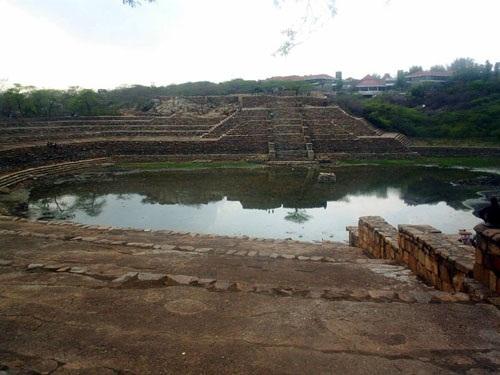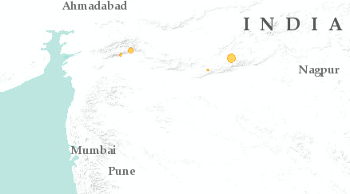Surajkund- Lake of the sun
- The place where Surajkund Mela takes place has an ancient connection to Tomar Dynasty.
- Surajkund (the lake of the sun) is the oldest-surviving monument of Delhi.
- Suraj Pal Tomar, in the 10th century, built Surajkund, the huge water reservoir along with a sun temple on the western bank.
- The reservoir was constructed around 686 AD,as said by Syed Ahmed Khan in his book Asar-us-Sanadid.
- The reservoir is built against the backdrop of Aravalli Hills forming a semi-circular shaped embankment.

- It is designed in the shape of a rising sun with an eastward arc.
Forest owlet
- The century old debate on forest owlet’s genetic relationship with spotted owlet is resolved.
- The bird belongs to the same genus as spotted owlet (Athene).


- The Heteroglaux blewetti is endangered under IUCN classification.
- Also the bird is endemic to the central Indian forests.
- It is sedentary resident with recent sightings from fairly open dry deciduous forest dominated by teak.
- The species faces a number of threats such as forest loss and degradation as a result of illegal logging and human encroachment, forest fires and minor irrigation dams.
- The birds is included under CITES Appendix 1.
Sunderbans Mangrove forest
- Unique mangrove ecosystem that hosts a sizeable tiger population is unable to expand due to developmental pressures and sea level rise.
- The Indian Sunderbans that comprise almost 43% of total mangrove cover.
- ‘State of Art Report on Biodiversity in Indian Sundarbans’ published by World Wide Fund for Nature, India, outlines the threats facing the ecosystem.
- The threats are climate change, habitat degradation due to industrial pollution and human disturbance, fuel-wood collection.
- If the present rate of change prevails, the Sunderbans may disappear due to sea level rise.
- Its natural response to retreat further inland is blocked by geographical features and man-made obstructions.
- The population density of the Indian Sunderbans outside the Tiger Reserve area is 1,000 people per sq km.
- Rehabilitation of former mangrove areas and creation of new mangrove habitations through intensified afforestation program are the only way out.
Jatan and Darshak
- Centre for Development for Advanced Computing (C-DAC), has developed software named “Jatan” that is set to revolutionize museum experience.
- The latest technology will help online visitors get a 3-Dimensional (3D) view of hundreds of artifacts displayed at the museums.
- The software will enable virtual tours to museums.
- The group has developed “Darshak”, a mobile-based application, aimed at improving the museum visit experience among the differently-abled.
- It allows real-time museum visitors gather all details about objects or artifacts simply by scanning a QR code placed near the object.
- C-DAC is the premier R&D organization of the Ministry of Electronics and Information Technology (MeitY) for carrying out R&D in IT, Electronics and associated areas.
Atal Bhoojal Yojana
- Atal Bhoojal Yojana is an ambitious plan aimed at efficient management of available water resources.
- Atal Bhujal Yojana will focus on demand side management (how to meet requirements by minimum use of water).
- The emphasis of the scheme will be on recharge of ground water sources and efficient use of water by involving people at the local level.
- The half of the fund of 6000 crore will be supported by a world bank loan of 3000 crore and the rest will be funded by central government.
- It would initially be implemented with community participation in Gujarat, Maharashtra, Haryana, Karnataka, Rajasthan, Uttar Pradesh and Madhya Pradesh.
Enhanced Oil Recovery Program –ONGC
- The program plans to introduce carbon dioxide injection in oil field to recover an extra 20 million barrels of crude oil.
- It is carried out by Oil and Natural Gas Corporation in its Gandhar field.
- The plan is carried out under enhanced oil recovery (EOR) program, whose objective is to improve India’s energy security.
- It will be the first large scale CO2 injected project in South Asia.
- Injected gas is miscible with residual oil and reduces its viscosity, making it easier to displace the oil from the rock pores.
Source: PIB, The Hindu, Business Standard


